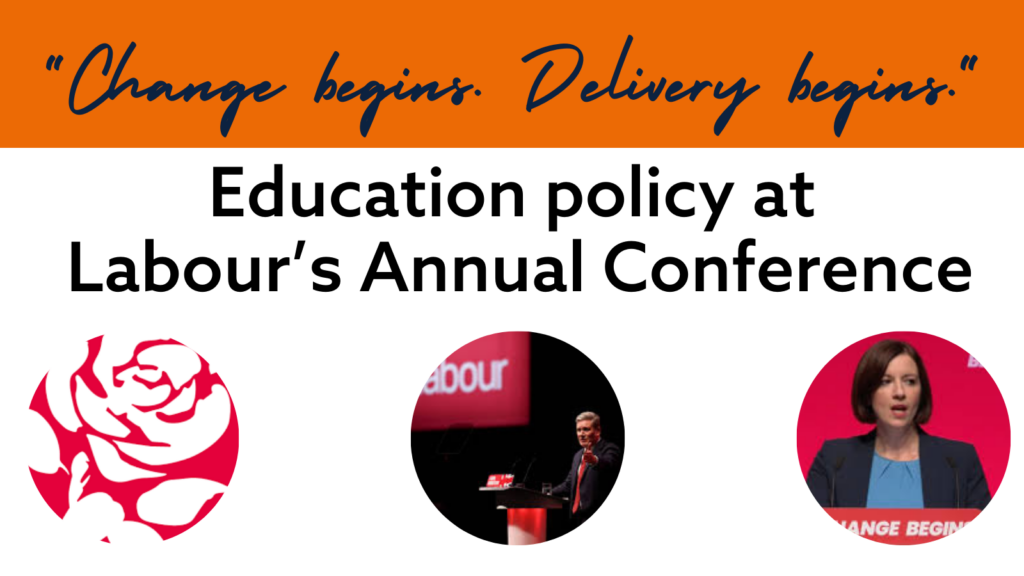“Change begins. Delivery begins.” – Education policy at Labour’s Annual Conference

In regards to education policy, what was discussed at the Labour Annual Conference 2024?
This was the party’s first conference in government for 15 years and took place in Liverpool from Sunday 22 – Wednesday 25 September with a jam-packed events timetable.
‘Keep the faith’, new PM Sir Kier Starmer urged as he vowed to build ‘a new Britain’, insisting the nation can become a country of pride, wealth and stability if the public accepts a series of difficult ‘trade-offs’.
Across the three days, various critical topics were tackled, but naturally, Schools North East had its sights set firmly on education. Regardless of how you personally felt about the results of the 2024 General Election, it was hard to ignore the possibility that a new government could mean a fresh start for the education sector, and that filled many with something they haven’t felt for a very long time: hope.
So, what did the conference hold in store for schools?
School-based nurseries
The Labour manifesto pledged school-based nurseries in order to open up greater access to childcare hours for families, outlining how spare school classrooms will be converted into high quality spaces for nurseries.
Fortunately (and perhaps surprisingly?), this doesn’t appear to be one of those infamous empty government promises that we know all too well. At the conference, Education Secretary Bridget Phillipson announced that the first school-based nurseries will open next September, with a £15 million capital funding round for up to 300 nurseries due to launch next month.
Bridget Phillipson said: “The first phase of our new nurseries, a high quality early education, boosting life chances for children and work choices for parents.”
As of next month, primary schools will be able to bid for a share of the funding pot to convert empty classrooms into nurseries. This works out on average at £50,000 per school. For more information on this, click here.
Curriculum updates
The Education Secretary, who recently commissioned the first big curriculum review in a decade, insisted that updates to the national curriculum should enable ‘modest changes’ to ‘keep pace’, as opposed to a ‘big overhaul every decade or so.’
A broad and enriching curriculum is a must, and we’re not opposed to overhauling the way it’s evaluated if that means better results for our children and young people.
Phillipson said: “We do need to build on what’s working, and we need to draw on some of the really brilliant practices out there that teachers are leading, however, you know, it has been 10 years since this was last changed.
“I think there is a problem as part of that around kind of a big bang approach, that you have a big overhaul every decade or so. And I think we need to consider how we allow the curriculum to kind of keep pace and make more modest changes, not just as a one off.”
[The Schools North East Curriculum Conference 2025, which is taking place on Tuesday 18 February, offers an invaluable opportunity for school leaders, educators, and curriculum specialists to collaborate, exchange ideas, and explore strategies. Bookings now open.]
New report cards
Labour made the proposed inspection ‘report cards’ a key manifesto pledge ahead of this year’s general election, but unions have urged that the Department for Education to take charge amid fears that Ofsted will be too involved – and have a detrimental effect on its outcome.
Jonny Uttley, Chief Executive of The Education Alliance Academy Trust, reiterated the importance of the DfE’s lead on the design, emphasising it should “be a replacement for school performance measures”.
“Opportunity not just for some of our children, but for all of our children.”
Phillipson spoke on the third and final day of the conference, outlining the direction of Labour’s plans for education.
The Education Secretary said: “as a Labour government, we see education as so much more than what happens in the classroom: it is about children, and it is about their opportunities. Opportunity not just for some of our children, but for all of our children.
“A vision of education centred not simply on schools or nurseries, knowledge or skills, university or college. But on our young people: on their chance to achieve and thrive, to succeed and flourish.”
As we outlined in our 2024 Manifesto for Education, the main political parties have all previously emphasised the importance of education, which is great on paper. However, despite the promises being made by political parties in respect of education, party manifestos didn’t sufficiently reflect the concerns or hopes of North East school leaders.
While Labour are indeed in charge now, it’s vital we hold all policymakers to their professed commitment to improving educational opportunities and outcomes for all children, especially in the most disadvantaged areas. It was a relief to hear this echoed in Bridget Phillipson’s own speech at the conference.
The topic of education itself was quite positive at the conference. But we won’t take our foot off the pedal and assume that this means our sector will finally get the treatment it has been crying out for since, well, seemingly forever.
We need a long-term, strategic plan. We need details and timelines and guarantees. We need to see evidence that the policies we’ve been promised have been prioritised.
And will we? Only time will tell…